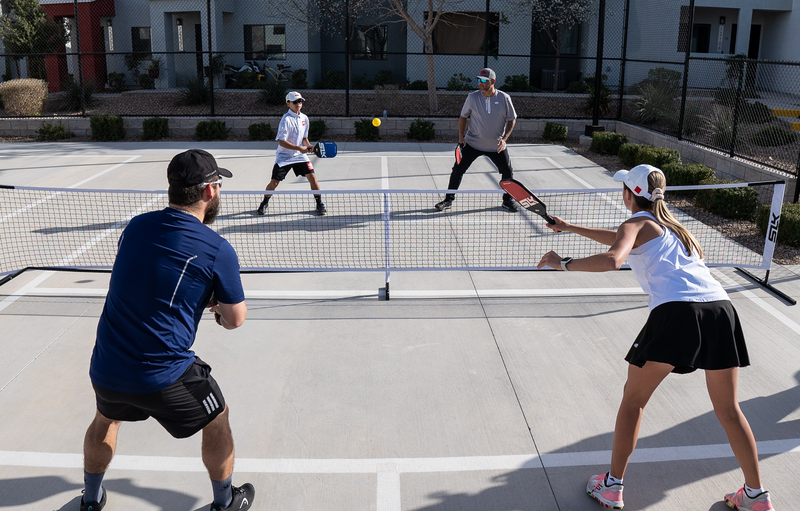If you are new to pickleball, or have played mostly in organized leagues, then the rules of open play or public courts may be confusing. Before you show up to your first public session, here are some etiquette rules of open play pickleball:
Pickleball paddle stacking
If you go to your next pickleball open play with one new piece of knowledge, it should be pickleball paddle stacking. Stacking your paddle is a way to keep track of which players are in line to play next.
If you arrive on a public pickleball court, look for a paddle holder and place your paddle in line. It will indicate who is next to play or next to “reserve” the court.
Although it’s not always the case, if you show up with three other people and would like to play together, you can stack your paddles on top of each other to signify you want to all play at the same time.
Different courts may handle paddle stacking in different ways. For instance, some courts have a rule where the winners stay on the court, where others will welcome four new players every game. Learn the rules of the court you’re on so you can follow the paddle stacking rules correctly.
Line calls
Line calls can be a bit tricky in pickleball, especially for newcomers, because you are expected to call your own lines. Learn all the rules of pickleball line calling here.
There will be many times when you just don’t know if the ball was in or out. If this happens, just call the ball in. The general rule is that if you do not see court between the line and your ball, you should call the ball in. Remember we’re all here to have fun, so be fair but always err on the side of your opponent.
Remember that the players on the same side as the lines where the ball landed are the ones to call the line calls. If you are on the other side, you do not call the ball “in” or “out” unless your opponent asks for your opinion. If you are a spectator, you have no rights to call any lines.
Respect everyone's property
Pickleball etiquette largely says that players should bring their own pickleballs, whether they are playing in a private club, a league, or a public situation. But for everyone who has ever used their own ball, and then lost that ball, you know how protective you can get.
If someone you are playing with contributes their personal pickleball to your game, you should do everything you can to chase after that ball and make sure the proper owner gets that ball back at the end of the game.
Loudly call stray pickleballs
Many pickleball facilities have more than one court, which means you are likely playing around other teams, sometimes without a barrier in between your courts.
If a ball from your game goes stray, especially if it’s on its way to another court, you should yell “Ball” loudly in their direction so they know it’s coming. A ball landing on a court where a game is in progress can cause injuries, the least of which may be a broken or sprained ankle.
If a stray ball from another game comes on to your court, then your current rally should stop and there will be a redo.
Respect your teammates and opponents
In recreational pickleball play, it’s important that you don’t take your own play or your teammate’s play too seriously. This does not mean you shouldn’t be competitive — but what it does mean is you should not start yelling at yourself or your teammate for making a mistake.
This is open play, you are here to work on your skills. If you want to be super competitive, then you can do so in a league or tournament setting.
Don’t be the coach
In open play and on public courts, you will run into a lot of players who are brand new or have less experience than you. However, this does not mean you should offer unsolicited advice — unless it’s asked for. Because not everyone learns in the same way, and unsolicited coaching could be seen as criticism to a new player.
If someone does ask for advice, feel welcome to coach as much as you like. But read the player, and only help as much as you feel they want you to.
On the other side of it, if you are a brand new player, do not feel shy about asking for advice or tips from the other players.
Know the rules
Although you are not expected to know all the rules of pickleball, even as you progress, you should know the basic rules. As you play more and more, you will learn the intricacies of the game and the rules, but showing up with a basic knowledge of the dos and don’ts will help you have a strong base for the game.

